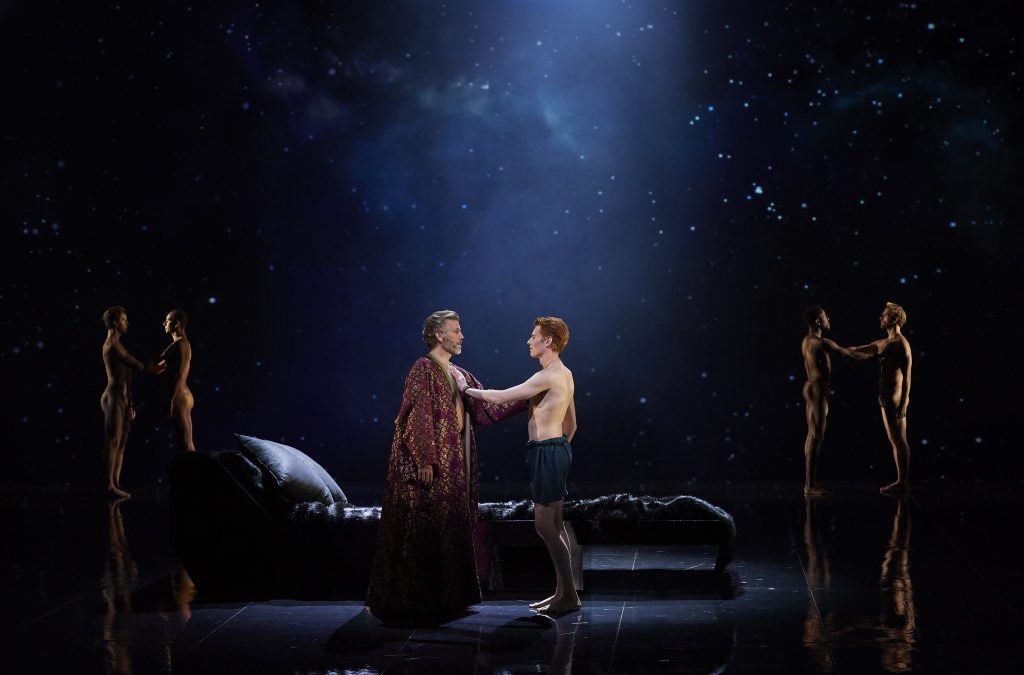Steely freedom fighter or deluded Messianic pretender? Shimon Bar-Kokhba, charismatic leader of the last organized Jewish Revolt, still commands strong feelings despite the passage of two millennia since the Romans crushed his ill-fated rebellion in 135 CE. The Emperor Hadrian, a controversial epic figure in his own right, weary of decades of stubborn resistance to Imperial rule on the Empire’s eastern flank, banished the Jews from Jerusalem and sold them into slavery. Judea was renamed Syria Palestina. History was forever changed.
Toiling against the dark, ever-present backdrop of a nascent post-Biblical age, the Canadian Opera Company brings its long-awaited production of Hadrian, its first major operatic commission in almost two decades, to the Four Seasons Centre stage, as brash and bold as it is exasperating. Five years in the making, composer Rufus Wainwright and librettist Daniel MacIvor’s frenzied portrait of passion, power and intrigue struggles and strains to break free from a mass of constraints.
The story, adapted from French novelist Marguerite Yourcenar’s Memoirs of Hadrian, derives its central theme from the Emperor’s legendary love affair with a striking youth, Antinous, whom Hadrian encounters on a life-altering visit to Greece. The union of souls that is essentially meant to power Wainwright’s celebration of spiritual transformation by way of same sex devotion never quite materializes, however, despite the presence of two supremely committed singer actors in the persons of Met opera baritone Thomas Hampson and fine young Canadian tenor Isaiah Bell in the primary roles. Granted, belief may be subjective but endless strings of insistent recitatives do not necessarily confer emotional authenticity. “He is loved!”, thrills Hadrian’s much-neglected wife, Sabina, observing from the shadows as Antinous mops the failing Emperor’s fevered brow. Suddenly, in a flash of melodrama, all the suffering, all the hurt, all the rejection so compellingly encapsulated in the character’s earlier aria, Where is your want?, by gifted soprano Ambur Braid is obliterated. The level of dramatic incredulity at work here is staggering.
Even more difficult to process is a profoundly muddled subplot featuring the ghosts of Hadrian’s grasping mother, Plotina, partnered by the former Emperor Trajan. Antinous must die if their status as anointed gods is to be preserved. The inscrutable conviction, allegedly rooted in ancient speculative accounts, is an exercise in tortured logic involving — among a tangle of other precepts — the principle of monotheism as practiced by the Nazarenes and Jews. Hadrian’s already frayed narrative thread, made all the more ragged by multiple flashbacks, becomes hopelessly intertwined with knotty notions of salvation, tolerance and divinity. Granted, any opera, past or present, is virtually guaranteed to devolve into chaos but in Hadrian, McIvor elevates the prevailing conflict to the level of anarchy.
Musically, the flow of experience assumes, if not greater proportion, then certainly a good deal more panache. Wainwright’s latest magnum opus is a significant advancement from his first opera, Prima Donna, unveiled in Toronto in June 2010 at the city’s annual Luminato Festival. The decidedly amorphous story of an aging diva in the throes of physical and psychic decline, conceived as overt Puccinian pastiche, offered little in the way of compositional complexity or invention. Not so with Hadrian. Wagnerian chromaticism, Verdian resonance, 40s Swing, Broadway musicals, crooner ballads, bebop and smooth jazz mix and mingle to form a sometimes expressionistic, sometimes lyrical sonic cocktail. Though decidedly in need of more potent ensembles on the scale of Hampson/Bell’s affecting Hadrian/Antinous duet, Without you, what can I do?, Wainwright’s heady score delivers frequent thrills. Orchestral colour and harmony are amply exploited, the unfortunate pulsing cliched ostinato in the Act III love scene notwithstanding. Choruses are suitably grand. Recits, arias and ariosos live in the moment, fervent albeit fleeting.
Conductor Johannes Debus leads a sprawling 73-player Canadian Opera Company Orchestra with great vigour and zest. Playing is consistently on point, strings bright and emotive, brass and percussion particularly emphatic.
A lithe cohort of semi-nude male dancers lends an air of artful, physical animation to the music during long languorous interludes.
A stellar cast adorns this admittedly glittery show. Hampson, Bell and Braid shine. Renowned soprano Karita Mattila is a suitably chilling Plotina, spectral and silvery. Roger Honeywell is an unyielding Trajan. Recent Lindemann Young Artist graduate bass David Leigh is the murderous Prefect Turbo. Much loved tenor Ben Heppner sings a perfectly gauged cameo as Dinarchus, wary old governor of Egypt where Antinous meets his violent demise. Gregory Dahl is the physician Hermogenes, a rumbly monument to fatalism.
Director Peter Hinton oversees the theatrical proceedings with admirable unobtrusiveness for the most part despite a marked degree of stiffness in his traffic management and blocking. The constant comings and goings hither thither on stage feel infinitely more mechanical than the quasi dreamscape setting would reasonably suggest. Lighting designer Bonnie Beecher and production designer Laurie-Shawn Borzovoy plunge us into a universe of darkness, conjuring “The fulsome moon. Ten thousand stars” that factor so prominently in Hadrian’s dying recollection of vanished pleasures. Costume designs by Gillian Gallow strike a less focused note, referencing a host of jumbled influences from Secessionist painter Gustav Klimt to four thousand year-old Minoan frescoes. Striking, certainly but utterly perplexing.
Flashy, ambitious, gravely flawed, Hadrian simultaneously maddens and provokes serious reflection. What is opera in the 21st century? The future will tell if Wainwright’s vision prevails, a gilded mirror to our fractured times.
* * *
Above: Thomas Hampson as Hadrian, Isaiah Bell as Antinous. Photo by Michael Cooper. Canadian Opera Company, 2018


